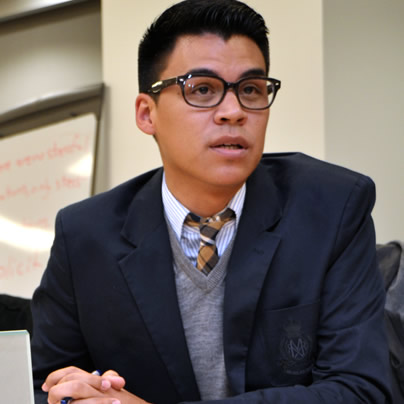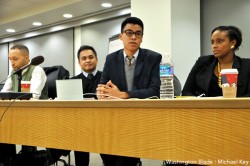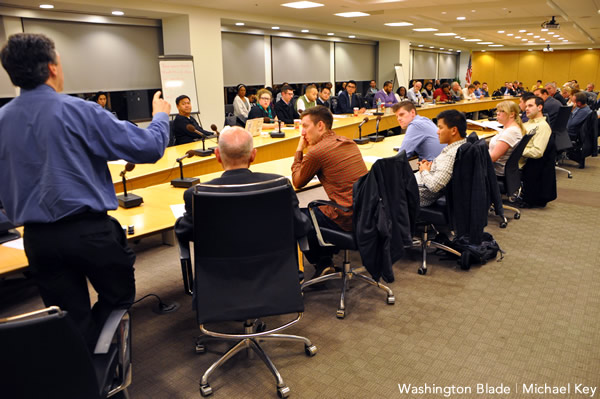Local
Stein Club election results upheld at special meeting
Challenge to validity of election dropped, proposed bylaw changes to be considered at next regular meeting

More than 70 members of the Gertrude Stein Democratic Club voted by an overwhelming margin Wednesday night to uphold the election two weeks ago of three new officers who gained control of the club in an upset victory.
The vote came in a special meeting called one week earlier by the club’s current officers to consider whether to invalidate the Dec. 3 club election of Martin Garcia, 27, as president; Angela Peoples, 26, as vice president for legislative and political affairs; and Vincent Villano, 26, as vice president for administration.
“We were all very excited to reaffirm the election of Marin Garcia and his slate,” said outgoing Stein Club President Lateefah Williams, who lost to Garcia by a vote of 47 to 45.
“And I’m very happy that we’re going to be moving forward as a united Stein Club,” Williams told the Blade after the meeting. Williams later said she misspoke and that she meant to say, “As a whole, we overwhelmingly reaffirmed the election of Martin Garcia and his slate.”
In a gesture aimed at avoiding a rift between the club’s old and new members, Williams withdrew from contention for the club presidency in the event that the special meeting voted to invalidate the election of the new officers and called for a new election.
“The new members have a hill to climb here with the old members,” said Stein Club treasurer Barrie Daneker, who won re-election unopposed after Garcia and his supporters chose not to run candidates for the treasurer and secretary’s position.
“But I’m confident that once they see their leadership and if they produce, then Gertrude Stein will be stronger than we’ve ever been in our 37 years of existence,” Daneker told the Blade.
Some feared that a bitter argument would erupt at the special meeting over a proposed challenge to the validity of 17 of the 46 new members who joined the club less than a week before the election.
The new members, who Garcia and his supporters recruited, are believed to have given Garcia, Peoples, and Villano their razor-thin margin of victory over Williams and her slate of candidates seeking the two vice president positions.
But during nearly two hours of discussion, no one moved to take action against the 17 new members, who came under question during the past week when the home addresses for 11 of them couldn’t be verified. Others questioned the qualification of six of the 17 new members who joined under a special membership category with a reduced fee of $15 restricted to students, senior citizens, and limited income people. The club’s regular membership costs $35.
Although many expected the special meeting to divide along the lines of the longtime club members and the new insurgent members who gained control of the club, those speaking in support of upholding the election and withdrawing the challenge came mostly from the ranks of the old members.
Gay Democratic activist and longtime Stein Club member Bob Summersgill said no one presented any evidence or valid rationale for disqualifying any of the new members.
“There is nothing in the bylaws that says anything about where you have to live,” he said. “There is nothing in the bylaws to define low income.”
Gay activists Lane Hudson and Steve Gorman, who are also club members of longstanding, said they were impressed with Garcia and his supporters’ political organizing skills that enabled them to bring in close to 50 new members.
Garcia told the meeting that he and the new members that supported him have been involved in local and national politics and Democratic Party activities. He said his objective is to strengthen the Stein Club by bringing in more members with diverse backgrounds so it can do more in its longstanding role as the city’s largest LGBT political organization.
Transgender activist and longtime Stein Club member Jeri Hughes, who was one of the members who challenged the club election, surprised some at the special meeting when she said the meeting should not vote on the question of invalidating the election or challenging memberships.
Instead, Hughes proposed bringing up the invalidation question at the club’s next regular meeting in January.
As she has in Facebook postings and in a Blade commentary, Hughes called the election a “farce,” saying the winning side “stacked” the election meeting with people who were “strangers” to the club.
While the new members acted within the club’s rules and bylaws, “that doesn’t make what they did right,” she said.
However, when fellow club member Ed Craft told her later that he planned to withdraw from the club because of his objection to the new officers’ takeover, Hughes urged him not to do so.
“I don’t think these are bad people,” she told Craft in a Facebook message Wednesday night. “I think they did something wrong…and foolish, but the club does good work and has done good work. We can still do good work. Leaving serves no purpose.”

Gertrude Stein Democratic Club President-elect Martin Garcia (Washington Blade photo by Michael Key)
Former club president Kurt Vorndran, who was among the longtime members who called for letting the election of the new officer’s stand, introduced a resolution calling for changing the club’s bylaws to restrict the ability to vote in the election of club officers to people who have been members for at least 30 calendar days.
The club voted to table Vorndran’s motion, with the intent to bring it up at the next regular meeting in January.
Craft told the Blade he believes many of the old members will withdraw from active participation in the club due to the flap over the election and for what he said was the failure of the special meeting to enable longtime members to raise concerns and ask questions.
“I feel the meeting tonight was a complete farce,” he said. “I feel it was staged, that Lane Hudson through his motions made it impossible for the meaningful exchange of information that was the purpose of this meeting to take place.”
Craft was referring to a set of rules governing the meeting that Williams and the existing Stein Club officers proposed at the beginning of the meeting but that were changed by motions introduced by Hudson and other members supportive of Garcia’s slate.
The changes, among other things, reduced the length of time for people to speak from three minutes proposed by Williams and the club’s board, to two minutes. Toward the end of the meeting, when a question and answer period called for by the rules proposed by Williams and approved by the meeting participants began, Hudson introduced a motion to end it after just two questions were raised and answered. The meeting attendees — the majority of whom were new members supportive of Garcia’s slate of officers — quickly voted to approve Hudson’s motion.
Craft said the abrupt termination of the question and answer period upset him and other longtime club members who wanted to ask more questions of Garcia and the other newly elected officers.
While Craft spoke to the Blade immediately after the meeting adjourned, club member Robert Brannum shouted to the members collecting their belongings and leaving the meeting room that he was outraged he wasn’t allowed to speak during the closing session of the meeting. When Brannum, who spoke earlier in the meeting, requested to speak at the closing session, Hudson and other members objected, saying the rules adopted at the start of the meeting prevented him from doing so.
“The whole purpose of having an orderly meeting is to achieve the objectives of the meeting, and that’s what we did,” Hudson told the Blade. “People had their say, they came together and we’re in a much better place than when the meeting began.”
In a statement she sent to the Blade Thursday morning, Williams said more effort will be needed to heal the rift between all of the old and new members.
“I think the meeting was successful as an initial first step at dialogue between long term and new members and bringing both groups together,” she said. “Unfortunately, due to some motions that ended the dialogue early, some members still feel that they did not have an opportunity to have their questions addressed.”
Williams added, “I think the key is to look at this meeting as the beginning of the process of healing and not the culmination of it. I hope that all members continue to engage one another to work through any concerns that may still exist. I wish the new board well and I hope that they continue efforts to help bridge the gap between long term and new members.”
District of Columbia
Judge rescinds order against activist in Capital Pride lawsuit
Darren Pasha accused of stalking organization staff, board members, volunteers

A D.C. Superior Court judge on Feb.18 agreed to rescind his earlier ruling declaring local gay activist Darren Pasha in default for failing to attend a virtual court hearing regarding an anti-stalking lawsuit brought against him by the Capital Pride Alliance, the group that organizes D.C.’s annual Pride events.
The Capital Pride lawsuit, initially filed on Oct. 27, 2025, accuses Pasha of engaging in a year-long “course of conduct” of “harassment, intimidation, threats, manipulation, and coercive behavior” targeting Capital Pride staff, board members, and volunteers.
In his own court filings without retaining an attorney, Pasha has strongly denied the stalking related allegations against him, saying “no credible or admissible evidence has been provided” to show he engaged in any wrongdoing.
Judge Robert D. Okum nevertheless on Feb. 6 approved a temporary stay-away order requiring Pasha to stay at least 100 feet away from Capital Pride’s staff, volunteers, and board members until the time of a follow-up court hearing scheduled for April 17. He reduced the stay-away distance from 200 yards as requested by Capital Pride.
In his two-page order issued on Feb. 18, Okun stated that Pasha explained that he was involved in a scooter accident in which he was injured and his phone was damaged, preventing him from joining the Feb. 6 court hearing.
“Therefore, the court finds there is a good cause for vacating the default,” Okun states in his order.
At the time he initially approved the default order at the Feb. 6 hearing that Pasha didn’t attend, Okun scheduled an April 17 ex parte proof hearing in which Capital Pride could have requested a ruling in its favor seeking a permanent anti-stalking order against Pasha.
In his Feb. 18 ruling rescinding the default order Okun changed the April 17 ex parte proof hearing to an initial scheduling conference hearing in which a decision on the outcome of the case is not likely to happen.
In addition, he agreed to consider Pasha’s call for a jury trial and gave Capital Pride 14 days to contest that request. The Capital Pride lawsuit initially called for a non-jury trial by judge.
One request by Pasha that Okum denied was a call for him to order Capital Pride to stop its staff or volunteers from posting information about the lawsuit on social media. Pasha has said the D.C.-based online blog called DC Homos, which Pasha claims is operated by someone associated with Capital Pride, has been posting articles portraying him in a negative light and subjecting him to highly negative publicity.
“The defendant has not set forth a sufficient basis for the court to restrict the plaintiff’s social media postings, and the court therefore will deny the defendant’s request in his social media praecipe,” Okun states in his order.
A praecipe is a formal written document requesting action by a court.
Pasha called the order a positive development in his favor. He said he plans to file another motion with more information about what he calls the unfair and defamatory reports about him related to the lawsuit by DC Homos, with a call for the judge to reverse his decision not to order Capital Pride to stop social media postings about the lawsuit.
Pasha points to a video interview on the LGBTQ Team Rayceen broadcast, a link to which he sent to the Washington Blade, in which DC Homos operator Jose Romero acknowledged his association with Capital Pride Alliance.
Capital Pride Executive Director Ryan Bos didn’t immediately respond to a message from the Blade asking whether Romero was a volunteer or employee with Capital Pride.
Pasha also said he believes the latest order has the effect of rescinding the temporary stay away order against him approved by Okun in his earlier ruling, even though Okun makes no mention of the stay away order in his latest ruling. Capital Pride attorney Nick Harrison told the Blade the stay away order “remains in full force and effect.”
Harrison said Capital Pride has no further comment on the lawsuit.
District of Columbia
Trans activists arrested outside HHS headquarters in D.C.
Protesters demonstrated directive against gender-affirming care

Authorities on Tuesday arrested 24 activists outside the U.S. Department of Health and Human Services headquarters in D.C.
The Gender Liberation Movement, a national organization that uses direct action, media engagement, and policy advocacy to defend bodily autonomy and self-determination, organized the protest in which more than 50 activists participated. Organizers said the action was a response to changes in federal policy mandated by Executive Order 14187, titled “Protecting Children from Chemical and Surgical Mutilation.”
The order directs federal agencies and programs to work toward “significantly limiting youth access to gender-affirming care nationwide,” according to KFF, a nonpartisan, nonprofit organization that provides independent, fact-based information on national health issues. The executive order also includes claims about gender-affirming care and transgender youth that critics have described as misinformation.
Members of ACT UP NY and ACT UP Pittsburgh also participated in the demonstration, which took place on the final day of the public comment period for proposed federal rules that would restrict access to gender-affirming care.
Demonstrators blocked the building’s main entrance, holding a banner reading “HANDS OFF OUR ‘MONES,” while chanting, “HHS—RFK—TRANS YOUTH ARE NO DEBATE” and “NO HATE—NO FEAR—TRANS YOUTH ARE WELCOME HERE.”
“We want trans youth and their loving families to know that we see them, we cherish them, and we won’t let these attacks go on without a fight,” said GLM co-founder Raquel Willis. “We also want all Americans to understand that Trump, RFK, and their HHS won’t stop at trying to block care for trans youth — they’re coming for trans adults, for those who need treatment from insulin to SSRIs, and all those already failed by a broken health insurance system.”
“It is shameful and intentional that this administration is pitting communities against one another by weaponizing Medicaid funding to strip care from trans youth. This has nothing to do with protecting health and everything to do with political distraction,” added GLM co-founder Eliel Cruz. “They are targeting young people to deflect from their failure to deliver for working families across the country. Instead of restricting care, we should be expanding it. Healthcare is a human right, and it must be accessible to every person — without cost or exception.”

Despite HHS’s efforts to restrict gender-affirming care for trans youth, major medical associations — including the American Medical Association, the American Academy of Pediatrics, and the Endocrine Society — continue to regard such care as evidence-based treatment. Gender-affirming care can include psychotherapy, social support, and, when clinically appropriate, puberty blockers and hormone therapy.
The protest comes amid broader shifts in access to care nationwide.
NYU Langone Health recently announced it will stop providing transition-related medical care to minors and will no longer accept new patients into its Transgender Youth Health Program following President Donald Trump’s January 2025 executive order targeting trans healthcare.
Virginia
Fellow lawmakers praise Adam Ebbin after Va. Senate farewell address
Gay state senator to take job in Spanberger administration

Gay Virginia state Sen. Adam Ebbin (D-Alexandria) delivered his farewell address on Feb. 16 in the Senate chamber in Richmond following his decision to resign from his role as a lawmaker to take a position as senior advisor to Democratic Gov. Abigail Spanberger.
Ebbin, whose resignation was to take effect Feb. 18, received a standing ovation from his fellow senators. Several of them spoke after Ebbin’s address to praise him for his service in the Virginia Senate from 2012 to 2026.
Ebbin first won election to the Virginia House of Delegates in 2003 as the first openly gay member of the General Assembly. He served in the House of Delegates from 2004 to 2012 before winning election to the Senate in 2011.
His Senate district includes Alexandria and parts of Arlington and Fairfax Counties.
“Serving in this body has been the greatest honor of my life,” Ebbin said in his farewell address. “Representing Northern Virginia in the General Assembly — my adopted home since 1989 — has been a responsibility I never took lightly,” he said.
“We are a 406-year-old institution,” he told his fellow lawmakers. “But, when I arrived, I had the distinct honor of being a ‘first’ in the General Assembly,” he said. “Being an openly gay elected official 22 years ago didn’t earn you book deals or talk show appearances — just a seat in a deep minority across the hall.”
Ebbin added, “Still, being out was a fact that felt both deeply personal and unavoidably public. I was proud, but I was also very aware that simply being here carried a responsibility larger than myself.”
Ebbin has been credited with playing a lead role in advocating for LGBTQ rights in the General Assembly as well as speaking out against anti-LGBTQ proposals that have surfaced during his tenure in the legislature.
In his speech he also pointed to other issues he has championed as a lawmaker; including strengthening education programs, expanding access to healthcare, safeguarding the environment, and legislation to help “stand up for working people.”
Among the LGBTQ rights legislation he pushed and mentioned in his speech was the Virginia Values Act of 2020, which bans discrimination based on sexual orientation and gender identity, among other categories.
“I’m particularly proud of our work ensuring Virginia modernized state law to protect LGBT people from discrimination in their daily lives, including in employment, housing, and public accommodations,” he said in his speech. “The Virginia Values Act of 2020 — my proudest achievement — established new protections for all Virginians,” he said.
“This law, the first of its kind in the South, passed with strong bipartisan support,” he stated. “And now — this November — after 20 years, Virginians will finally be able to vote on the Marriage Equality Amendment, which will protect the ability to marry who you love. It’s time for our state constitution to accurately reflect the law of the land.”
He was referring to a proposed state constitutional amendment approved by the General Assembly, but which must now go before voters in a referendum, to repeal a constitutional amendment approved by the legislators and voters in 2006 that bans same-sex marriage.
The U.S. Supreme Court’s Obergefell ruling legalizing same-sex marriage nationwide voided the Virginia same-sex marriage ban. But Ebbin and LGBTQ rights advocates have called on the General Assembly to take action to repeal the amendment in case the Supreme Court changes its ruling on the issue.
In his new job in the Spanberger administration Ebbin will become a senior advisor at the Virginia Cannabis Control Authority, which regulates policies regarding marijuana possession and distribution.
Ebbin was among the lead sponsors of legislation in 2020 to decriminalize possession of marijuana and of current pending legislation calling for legalizing possession.
“When I first entered the General Assembly, I saw too many lives upended by a simple marijuana charge — jobs lost, futures delayed, families hurt,” he said in his speech. “And for far too long, that harm was baked into our laws. That is no longer the case. The times have changed and so have our laws.”
Ebbin said he was also proud to have played some role in the changes in Virginia that now enable LGBTQ Virginians to serve in all levels of the state government “openly, authentically, and unapologetically.”
“I swore to myself that I wouldn’t leave until there was at least one more lesbian or gay General Assembly member,” Ebbin said in his speech. “But when I leave, I’m proud to say we will have an 8-member LGBTQ caucus.”
And he added, “And if anyone on the other side of the aisle wants to come out, you will be more than welcome — we’re still waiting on that first openly gay Republican.”
-

 Baltimore4 days ago
Baltimore4 days ago‘Heated Rivalry’ fandom exposes LGBTQ divide in Baltimore
-

 Real Estate4 days ago
Real Estate4 days agoHome is where the heart is
-

 District of Columbia4 days ago
District of Columbia4 days agoDeon Jones speaks about D.C. Department of Corrections bias lawsuit settlement
-

 European Union4 days ago
European Union4 days agoEuropean Parliament resolution backs ‘full recognition of trans women as women’





















